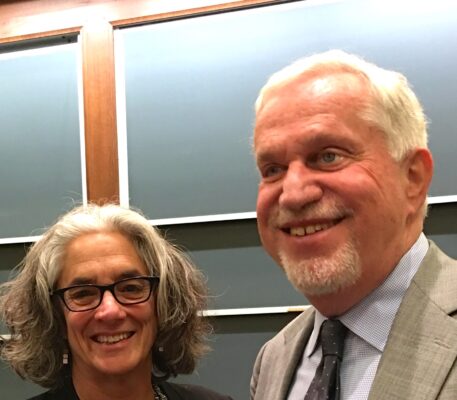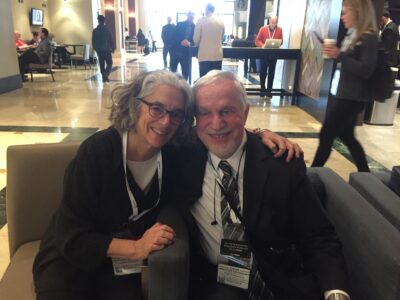
When I submitted my book manuscript to the American Bar Association in 2015, an East Coast lawyer reviewer had but one question. It basically boiled down to this: “How the hell do I find clients who want to resolve legal claims without fighting? With collaboration, calmness, and kindness instead of conflict?”
My answer was and remains simple: Structured Negotiation attracts problem-solvers who value cooperation and relationship-building. As a disability rights and digital accessibility strategy it attracts disabled people committed to lasting accessibility and full inclusion of people with disabilities in all aspects of life.
I don’t have to “find” these clients because for the past 29 years these committed and ethical problem-solvers have found me. One of those people was my friend and client Paul Parravano, a kind, generous man, an accomplished professional, a beloved community and family member, and an unsung hero of Structured Negotiation.
Paul died last month from cancer at the age of 71. The top image in this post shows us smiling together at the East Coast launch for my book in November 2016 at Harvard Law School. Paul helped organized the event and shared the stage as we told stories and offered the strategies of Structured Negotiation, the collaborative process he played an important role in developing.
Jump to:
Structured Negotiation successes thanks to Paul
Paul Parravano was instrumental in the success of three Structured Negotiations.
Braille Statements from American Express
I met Paul in 2002 or 2003 when he contacted Linda Dardarian and me to ask if Structured Negotiation could help convince American Express to offer braille account statements. He had learned of Structured Negotiation success in bringing Talking ATMs, accessible websites and braille statements to banks in the United States. He wondered if the strategy would work to make credit card statements accessible to him.
To Paul, access meant braille, the reading format he had relied on since becoming blind as a toddler. The format that allowed him to succeed as an undergraduate at Harvard, as a law student and lawyer, as an advocate, and in his career at MIT.
Like so many of our clients, Paul had done his homework before calling me. Linda and I put his efforts to good use when we contacted the company. As I described in my book:
After American Express denied Paul’s request for statements he could read, Parravano discovered that the company offered braille to Canadian account holders. We included that fact in the opening letter (the Structured Negotiation alternative to a legal complaint), and even gave the company contact information for the Canadian braille vendor to whom Parravano had spoken.
In a lawsuit, “smoking gun” evidence helps convince a judge that one side deserves to win. Proof that American Express offered braille to Canadian customers was strong evidence that the company could offer braille in the United States. But in Structured Negotiation we have no incentive to hide the ball, no need to save our evidence for a motion or trial. We were trying to solve a problem at American Express, not prove a legal violation. Structured Negotiation, a Winning Alternative to Lawsuits (2nd Edition) page 103
That opening letter led to a robust settlement agreement with American Express announced in a June 2005 press release.
More than doing his homework before contacting us, Paul’s participation in the negotiations were crucial to the ultimate success of the project. He was joined in this effort by Clarence Whaley, a friend he introduced us to, who died in 2008:
During two years of phone negotiations, Parravano and Whaley explained why braille statements mattered. Initially, American Express thought (as many companies do) that having staff read information aloud is a good alternative to accessible formats. But braille was critical to the financial independence of both men. Parravano explained braille’s distinctive and unique qualities. He shared his experience of “stopping his fingers” to explore a braille word or phrase in a way that was not possible for him with any other format.
Parravano and Whaley were both happily married. Yet, they used sincerity tinged with levity to explain to American Express why they did not want to rely on their sighted wives to read their statements. Whaley had a sharp wit, and his ability to engage the (mostly male) American Express team was palpable across thousands of miles of telephone wires.
The same was true for Parravano, who was responsible for his family’s finances. American Express negotiators were attentive as he explained that in his busy schedule, reviewing statements independently on the bus during his daily commute was not a convenience, it was a necessity.Structured Negotiation, a Winning Alternative to Lawsuits (2nd Edition) page 136
The American Express opening letter reflecting Paul’s advance work, and the negotiations reflecting Paul’s winning personality and serious commitment to inclusive communication and disability civil rights, resulted in long term change at the giant financial company. As I wrote in my book, “In 2021, almost two decades after the agreement was signed, Parravano estimates that his braille statements from American Express arrive before the print version 60 to 70 percent of the time.”
Accessible credit reports across the nation
In 2008 Structured Negotiation led to commitments by Equifax, Experian, and TransUnion to make free credit reports and other information available to people who could not read standard print. In a sweeping settlement agreement reached without a lawsuit on file the companies agreed to make online reports accessible and offer those reports in braille, large print and audio format.
That settlement, and those negotiations, never would have happened without Paul Parravano.
Why?
Because two years before the law in the United States required the credit reporting companies to offer free credit reports, Paul Parravano knew that advocacy would be needed to make those reports available to blind people.
Having experienced the power of collaboration while working with American Express, Paul called Linda and me to see if we could help make sure he would have independent access to his credit information once the law went into effect.
Paul joined with blind advocates Lucy Greco and Lori Gray and with the California and American Councils of the Blind in proposing Structured Negotiation, meeting with the companies, and hammering out the agreement, announced in a press release quoting Paul:
We truly appreciate the credit reporting companies’ willingness to engage in discussions with us to find a solution to the problem of inaccessible credit reports,” said Paul Parravano, a blind M.I.T. employee in Cambridge, Massachusetts, who was involved in the discussions. “Today’s announcement, reached as a result of the collaborative process, is an important milestone in the blind community’s quest for independent control over their financial information.2008 Accessible Credit Report press release
Over a decade later, when the passage of time required a new advocacy effort, Paul was there to help kick off a renewed Structured Negotiation. Because of the relationships formed the first time around and the good faith the companies (and we) exhibited over many years of post-settlement work, our renewed engagement with the credit reporting companies went smoothly.
A new agreement was reached in 2023, announced by a press announcement just last year.
For Paul and I the renewed credit report negotiations proved to be our final project together. We didn’t want it to be.
Paul had deep roots in Italy and travelled there often. The last time we met, in Boston in 2022, we talked about finding a way to do a talk or training together in Italy. Paul was eager to help the Italian financial industry become more accessible to blind people. If he’d had more time, I know he could have made that happen.
Back to topCommunity praise for a life well-lived
I urge readers to dip into the content about Paul Parravano linked in the next section to learn about Paul’s long career as an Massachusetts Institute of Technology (MIT) administrator and his unflagging civic and non-profit engagement dedicated to improving the lives of blind people.
For this article, I asked our mutual friend Kim Charlson, one of the first blind woman to serve as Director of a state-wide Braille and Talking Book library, the first blind woman to serve as president of the American Council of the Blind, and a global leader in the blind community to share a few words:
Paul was always ahead of the curve on access issues. He knew when an issue was going to be an access problem, and he just naturally went into advocate mode and wanted to fix the problem.
I was privileged to work with him on several issues over the years, and there was no stronger advocate for access for people who are blind or have low vision than Paul. Equity was so important to him, and his other passion, which we shared, was a love of braille and the importance of braille literacy.
Paul served on the Perkins Library Board for nearly twenty years, and I had so many opportunities to seek his counsel and guidance. He will be sadly missed — the blindness community has lost a true friend.Kim Charlson, Executive Director, Perkins Braille & Talking Book Library
The Parravano family has established the Paul Parravano Memorial Fund at MIT in support of student research in the field of assistive technology.
Read more about Paul

- MIT ran this tribute to Paul after his death: Paul Parravano, longtime liaison to elected leaders and MIT’s neighbors, dies at 71 I love the subtitle on this article, which reads: “Former co-director of the Office of Government and Community Relations is remembered for his care and compassion.”
- Paul’s obituary
- Cambridge City Council Resolution on Paul Parravano’s passing
- LinkedIn post on Paul’s passing by Samuel Gebru, Managing Director, Black Lion Strategies and Professor of the Practice of Political Science, Tufts University .
- Interview with Wil Butler and Cordelia Mcgee-Tubb on the Be My Eyes13 Letters Podcast